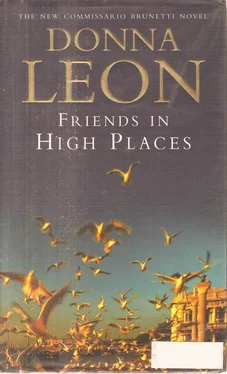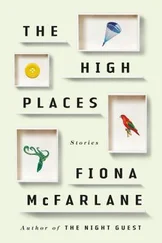After opening the door he finally gave voice to his surprise. ‘I find it incredible,’ he said. ‘No one would have killed him. There’s no reason for such a thing. And that building’s empty. How could anyone have seen what happened?’
When neither Brunetti nor Vianello spoke, dal Carlo walked through the door, ignoring Signorina Dolfin, busy at her computer, and saw the two policemen to the outer door of the office. None of them bothered with farewells.
Brunetti slept badly that night, waking himself repeatedly with memories of the day. He realized that Zecchino had probably lied about Rossi’s murder and had seen or heard far more than he admitted; why else had he become so evasive? The endless night dragged in other things: Patta’s refusal to see his son’s behaviour as criminal; his friend Luca’s lack of sympathy for his wife; the general incompetence that handicapped his every working day. Yet it was the thought of the two young girls that most troubled him, one so reduced by life that she would consent to sex with Zecchino in that squalid place and the other trapped between grief for Marco’s death and the guilty knowledge of what had caused it. Experience had beaten any trace of the cavalier out of Brunetti, but still he could not rid himself of a grinding pity for these girls.
Had the first one been upstairs when he found Zecchino? He had been so intent on fleeing the house that he had not gone up to the attic to see if anyone else was there. The fact that Zecchino was coming down the stairs did not mean he was going out; he could just as easily have been on his way to investigate the noise made by Brunetti’s arrival, leaving the girl behind him in the attic. At least Pucetti had provided a name for the second one: Anna Maria Ratti, who lived with her parents and brother in Castello and was an architectural student at the university.
It was some time after he heard the four o’clock bells ring that he decided to go back to the house that morning and try to talk to Zecchino again; soon after, he fell into a peaceful sleep, waking only after Paola had left for the university and the children had gone to school.
After he dressed, he called the Questura to tell them he would be late in arriving and went back to the bedroom to try to find his pistol. He pulled a chair over to the armadio, climbed up, and saw on the top shelf the box his father had brought back from Russia at the end of the war. The padlock was in place on the hasp on the front of the box, but he had no idea where he had put the key. He pulled the box down from the shelf, carried it over and set it down on the bed. A piece of paper was taped to the top, on it a message printed in Chiara’s clear hand: ‘Papà - Raffi and I are not supposed to know that the key is taped to the back of the painting in Mamma’s study. Baci.’
He went and got the key, wondering if he should add something to her note; no, better not to encourage her. He unlocked the box and removed the pistol, loaded it, and slipped it into the leather holster he had clipped to his belt earlier. He put the box back in the closet and left the house.
The calle, as had been the case both times he had come here before, was empty, and there was still no sign of activity on the scaffolding. He pulled the metal hasp free from the wood and went into the building, this time leaving the door open behind him. He made no attempt to soften his footsteps or disguise in any way the sound of his arrival. He stopped at the bottom of the steps and called up, ‘Zecchino, it’s the police. I’m coming up.’
He waited for a moment, but no answering sound or shout came from above. Regretting that he had forgotten to bring a flashlight and glad of what little light came in from the open door behind him, he walked up to the first floor. There was still no sound from above. He went up to the second floor, then the third, and paused on the landing. He opened the shutters of two windows, providing enough light for him to see his way back to the staircase and up to the attic.
Brunetti paused at the top. There were doors on either side of the landing and a third one at the end of a short corridor. A good deal of light filtered in from a broken shutter on his left. He waited, called out Zecchino’s name again, and then, strangely comforted by the silence, went to the first door on the right.
The room was empty; that is, no one was inside, though there were some boxes of tools, a pair of sawhorses, and a discarded pair of lime-covered painter’s pants. The door opposite led to the same sort of cluttered emptiness. That left only the door at the end of the corridor.
Inside, as he had hoped, he found Zecchino, and he also found the girl. In the light that sneaked down from a dirty skylight in the roof, he saw her for the first time, lying on top of Zecchino. They must have killed him first, or else he had given up and fallen under the rain of blows, and she had fought on, quite vainly, only to fall in the end on top of him.
‘Gesù bambino,’ Brunetti said softly as he saw them and resisted the urge to make the sign of the cross. There they were, a pair of limp figures, already shrunken in that special way death makes people look smaller. A dark halo of dried blood extended around their heads, which lay close together like puppies or young lovers.
He could see the back of Zecchino’s head and the girl’s face, or, more accurately, what was left of her face. Both of them appeared to have been battered to death: Zecchino’s skull had lost all rotundity; her nose was gone, destroyed by a blow so violent that all that remained was a shard of cartilage lying across her left cheek.
Brunetti turned away from them and looked around the room. A pile of stained mattresses was heaped against one wall. Beside it lay the pieces of clothing – he realized only when he looked back at the dead couple that they were half naked – which they had discarded in their haste to do whatever it was they did on those mattresses. He saw a bloody syringe and the memory rushed at him of a poem Paola had read to him once in which the poet tried to seduce a woman by telling her that their blood was mingled inside the flea that had drunk blood from both of them. At the time, he’d thought it an insane way to view the union of man and woman, but it was no more insane than the needle that lay on the floor. Beside it lay a few discarded plastic envelopes, probably not much bigger than the ones that had been found in the pocket of Roberto Patta’s jacket.
Downstairs, he pulled out the telefonino he had thought to carry that day and called the Questura, telling them what he had found and where to come to find him. The voice of professionalism told him to return to the room where the two young people lay and see what else he could discover. He chose to remain deaf to it and, instead, stood idly in a patch of sun in front of the building opposite while he waited for the others to come.
They eventually did, and he dispatched them upstairs, though he resisted the temptation to tell them that, as there were no workers in the building that day, they could get on with their investigation of the scene. There was nothing to be gained from a cheap gibe, and it would make no difference to them to learn that they had been duped the last time.
He asked who they’d called to examine the bodies and was glad to learn it was Rizzardi. He didn’t move when the men went into the building and was still standing there twenty minutes later when the pathologist arrived. They nodded at one another by way of greeting.
‘Another one?’ Rizzardi asked.
‘Two,’ Brunetti said, turning toward the building and leading the way.
The two men made their way upstairs with little difficulty, the shutters all open now and light flooding in. At the top of the stairs they were drawn, moth-like, to the bright lights of the technicians that spilled out of the room and down the corridor, beckoning them to come and see this new proof of the fragility of the body, the vanity of hope.
Читать дальше











